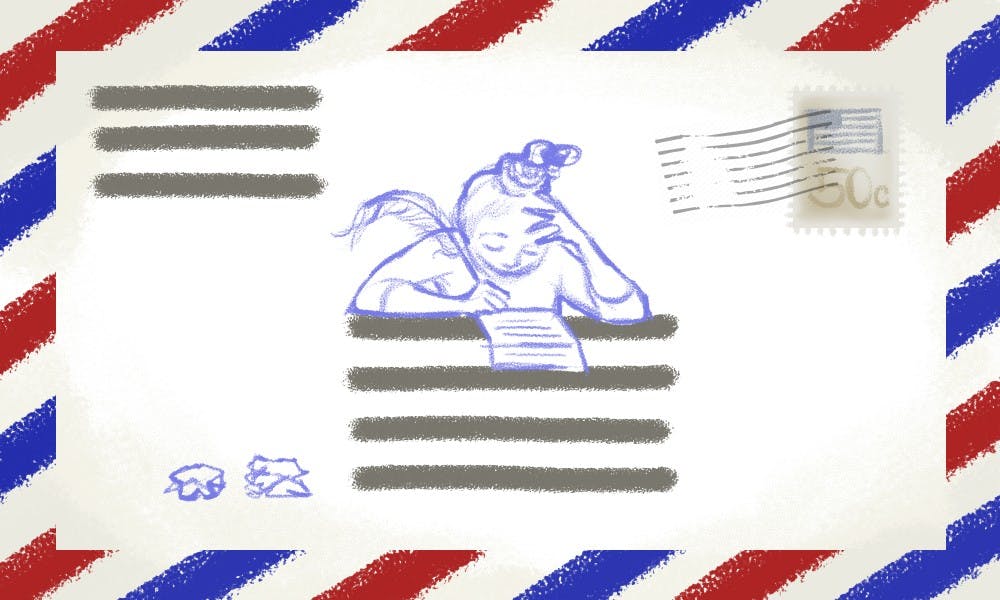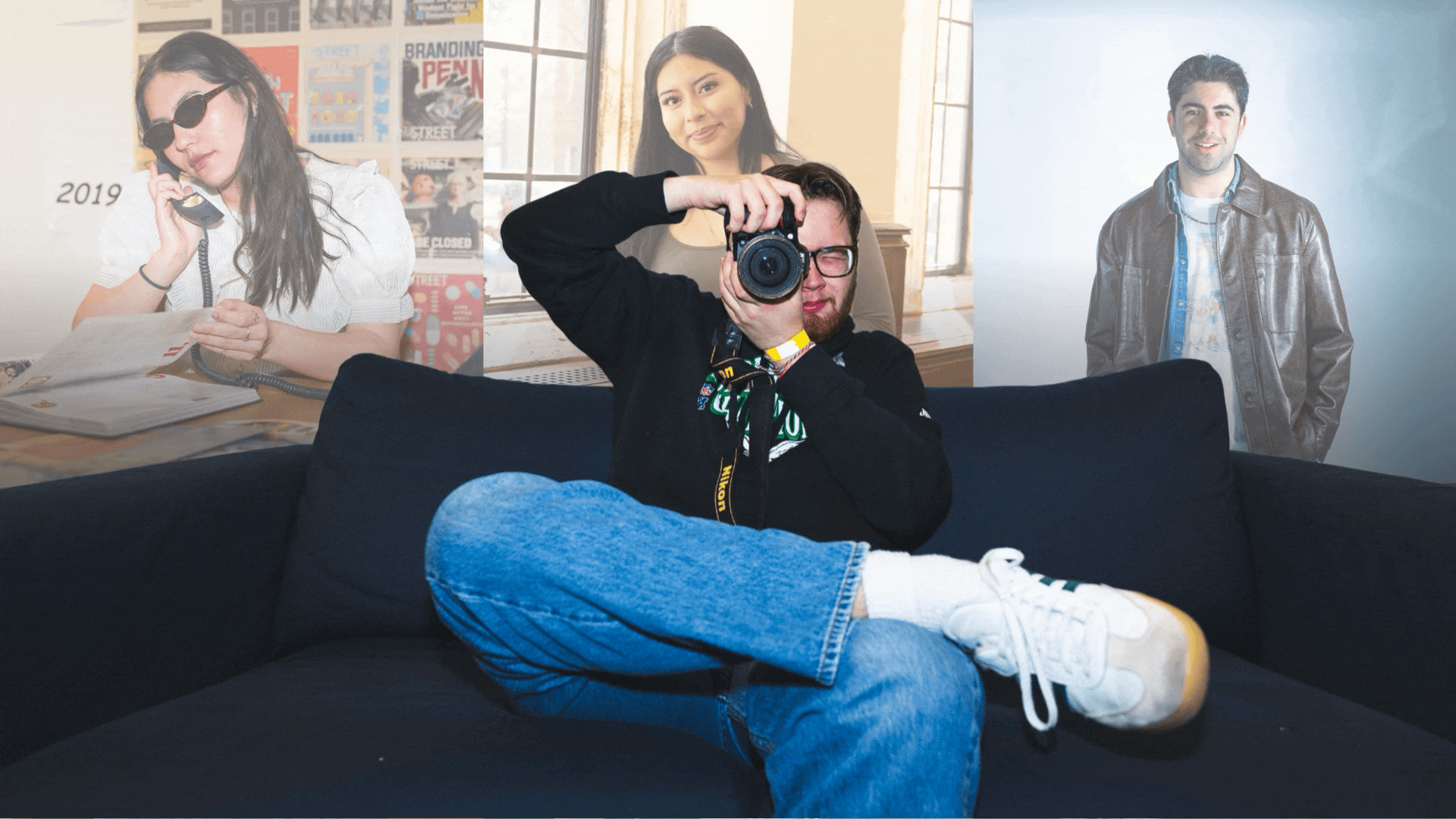These are three letters that I wrote last semester after returning to Penn from a leave of absence. I decided to publish these ones in part because I hope they can be a form of guidance for anyone who might need it—a source of strength and emotional disclosure that can sometimes be difficult to find on our campus. However, I also hope to challenge everyone who reads them to break some of the norms on campus to which we have uneasily grown accustomed, so I have included a fourth letter addressed to Penn. These are letters that I have written to a few of the people—coworkers, peers, mentors, near–romantic interests—that I consider(ed) to be important to me.
Dear Jo,
It is 4am, and I haven’t slept in 60-hours, which has been tiring but also exhilarating as most meaningful experiences are. I am sitting in the Newark Airport about to catch a red eye to Green Bay, Wisconsin to spend Thanksgiving with a family that's not mine and that I've never met. This will be my first Thanksgiving in years, and I am profoundly excited for it. In some coincidental yet wildly appropriate metaphor, I'm writing you in the purgatory that is waiting at the airport. Sometimes I simply have so many thoughts that I am compelled for my own sanity to write them down, and at others I wish to articulate them with nuance or without being interrupted in person, Given my current state of exhaustion, this is more likely the former than the latter.
The last 2 months have been the kind of bizarre journey that could only exist in this particular time and place. They are quintessentially the moment, yet intimately foreign to me. My leave of absence has left me so far beyond prepared to handle life at Penn that I flit between a constant grind of work, boredom, and a profound happiness. However, I have evolved to a careful resting place of quiet existentialism. I have a deep and visceral debt to you and Exodus. The privilege to see and gain access to the metaphysical composition of so many different individuals is one that few people get beyond - if they dare - themselves. The sheer level of discipline required to be a caseworker combined with the propulsion of working with individuals who look to you for guidance drove me to a level of performance and output that I didn’t know was possible. Not only was I impacting my clients, but they, you, and the social work framework (despite and because of its flaws) were transforming me.
The University of Pennsylvania is a place that would mix with you like oil and water, Jo. Spaces and experiences in which extreme material and capital deprivation are the norm do not compute. They simply do not exist here even if experienced by students from marginalized communities, referenced in abstract ways by the civically and socially minded, and studied in academic departments. The Penn experience is surreal, gut-wrenching, and unyielding. It is thrust upon you like an unsheathed sword, and if you are caught by surprise or enter without a purchased suit of armor, you receive a brutal awakening. It is the inverse of social work - where the rich and privileged opt to send their children to receive an education and prepare them for a rich and privileged life.
In returning to school, Penn and I were both familiar and different. I am in some ways still in awe of my transformation over the last year. In entering social work, I felt myself bending and reshaping to a certain mold. I came back to Penn fresh and new in a form ultimately unsustainable here. Re-entering the Penn community has not only entailed a certain amount of culture shock but also mandates that some of these contours again be remade. While initially resistant to these transformations in myself, I now find myself somewhat ambivalent. There is no such thing as “going back” - only who I was, am, and could be within the choice framework granted to me.
To a degree, you were right when you told me that these untranslatable experiences do not necessarily have to be a burden. I regret nothing. It’s 5am, and my plane is boarding now. Though there may be parts of this letter that don’t make sense or that sound like academic bullshit (go ahead and roast me), know that I miss you dearly and that you’re still here. And so am I.
Always yours,
L
Dear Caleb, Cal, CEB, etc.
I know you hate text messages, so I wrote you a letter instead. I was going to physically write it, but we both know you couldn’t have read my handwriting anyway (I am always too busy to master the crafts of creative expression, or so I tell myself). I decided to write because I figured it would be the best way to articulate what I’m trying to say and give you the time and space to process it. I still value letters as a mode of communication for this reason.
When I first met you, I didn’t know what to make of you or our conversations, but we each found it meaningful in a way that we didn’t understand. I’m sorry that what was once beautiful and innocent—without structure—developed into a complicated mess for both of us. Before you left for break, I asked you if you had finished the book that I gave you. And you hadn’t. I didn’t ask because I wanted to force you to read it or because you had to at all. You make your own choices. I gave you the book because I could tell that you were searching for meaning in your life.
You told me you might read the book on the plane, and I could tell that you wouldn’t. I’m not offended. However, if you don’t plan to read it anytime soon or don’t want to, then I’d like it back. Not because I hate you, dislike you, or feel resentful about you having it, but rather because I find it meaningful, and I could give it to someone else who would actually want to read it. To me, that seems like a better use of it than sitting on your bookshelf untouched for the foreseeable future. You don’t have to read the book if you don’t want to. That would be contrary to the book’s intention. But if you don’t plan to, can I at least have it back? I mean this in the friendliest way possible, and you can have it back at any point should you so choose.
But if you’re not going to read it, I might as well give you the gist: life is meaningless. Sort of. You can have happiness and social relationships, but eventually the destructive power of the universe comes and takes all of it away. It wipes it all into oblivion. But—there’s a giant "but"—this doesn’t mean that you just give up. The book grapples with nihilism and comes out the other side in one piece. Just because life is possibly pointless doesn’t mean your life has to be. If none of us mean anything at all, then it is also true that all of us mean everything. It’s self–referential nihilism, and, therefore, each of us is our own God. Life is meaningless except for what we each decide is meaningful for ourselves.
I’m telling you this because I must admit that I’m still confused about you—not in a romantic or platonic way. Rather, I’m confused about whether or not you think spending time with me is meaningful. In an fantastic moment of irony, you just didn’t read that motherfucking book. And if you don’t want to, that’s ok, but, then, respectfully, I have to ask: what are you doing spending time with me and in your life in general?
I am bringing this up not because I necessarily want a romantic relationship with you or because I want to force you to talk about your feelings. It’s not my place to tell you what to do or force you to do anything. You’re a human being that makes your own decisions, and there is so much inherent worth in deciding for yourself what it is that you want. I would never be so entitled as to try to take that away from you or attempt ownership of your decisions. However, I am entitled to discussions on the decisions that you make that relate to me. We can’t go back, but I don’t want to lose our friendship because you were too cowardly to troubleshoot the problem. What are you afraid of in the first place? Being vulnerable?
So, Caleb, I respectfully ask: what the fuck are you doing? And if you don’t know, that’s okay. You don’t have to have an answer, and there’s not necessarily a right one. But we have to decide what being friends is going to look like. I’d hate to lose you because you’re scared.
Hopefully still your friend?
Laura
My former acquaintance,
If you hadn’t gathered by now, I am a strong believer in the power of the self. For me, the meaning of life is my relationship with myself and my relationships with other people. Your relationship with yourself is your most intimate and sacred space—you have full entitlement to yourself and your personhood. You deserve to discover yourself at your own pace and on your own terms. If I infringed upon that space for a moment, the violation was in an effort to prevent you from surrendering yourself over to anyone or anything. That’s what friends do. They remind you who you are and what you’re capable of.
To paraphrase one of the essential claims of my favorite book: The only real justification for making good money is to never give up your intellectual integrity or turn your back on who you really are. For you to leave the “Penn experience” with only cynicism or—worse—as a sell out would be an enormous injustice. You are smarter, better, and more emotionally substantive than either of those outcomes.
There is an enormous joy in engaging with the classes you care about even if the students around you do not. Penn is a place full of people with no idea why they’re here. They were told that it was the best, so they came. Most of the students here may be conformist robots with little sense of self, but you get out of the classes what you put into them. Real value and learning can be derived if you try. Be at Penn because you want to be here, not because you’ll make money or because it will impress other people.
You decide who you truly are. You so clearly wish to be your own person, which is a quality that I admire, value, and share. While you construct the person that you are and will be, fiercely guard your right to self–determination. And love yourself with your entire capacity. You are as beautiful, kind, and powerful as you decide to be. So really? You’re going to let Penn and its student body kill your love of learning? Fuck that. Take whatever Penn demands and make it yours. Because often it is only within the context of what we are not that we can discover who we truly are.
Always, your friend,
L
Dear Penn,
As a campus culture, we abstractly refer to the university's "problems" as if they arrived from nowhere, brought by the heavens upon us without the opportunity for respite. This is in part true—the origins of our toxic campus started long before any of us were born or thought about. They are systemically produced structural issues: the rise of the knowledge economy, the fantasy of the college admissions market, increasing socio–economic inequality, contemporary ideological and political discourses, etc. We can blame the University, which is surely warranted—not just because of its policies, but also because the "Ivy League" is a driving force of the increasingly sick, maladapted American University system. However, knowing the "whys" does little to tell us "how."
"How" is always the much more important, much more difficult question to answer. Only by tracing the "how" could we possibly hope to navigate out of the enormous mess in which we find ourselves. This is not to suggest that we—all together—can suddenly "fix it." We can't. Systemic problems require systemic solutions. It's much larger than us, or even Penn for that matter. However, we're the problem too. We look the problem in the mirror everyday; we see the whites of its eyes in our friends, our professors, and our administrators. The "how" on campus is in the lack of meaningful student sociality or an application process for undergraduate clubs.
The problem is endemic and intractable, produced by each one of us everyday. We are all indicted. This is not to shame us, but rather to unburden us from the pretense of the pristine. If we ever hope to build something better for the future, we require a reckoning. We must trace the "hows" in ourselves not as a source of humiliation or guilt, but as a means of disentangling bigger realities about how our "problems" are systemically and socially produced. This is an enormous ask, and one at which we are ultimately predestined to fail. But, luckily, I am not afraid of failure. And nor should any of you be. After all, we are all failing together everyday. Our question—the question for all of us students, professors, and administrators alike—then becomes: how best to fail?
Ambivalently yours,
L
Laura Beck is a sophomore from Indianapolis studying political science.
This article was updated Apr. 3 at 12:20 p.m.







